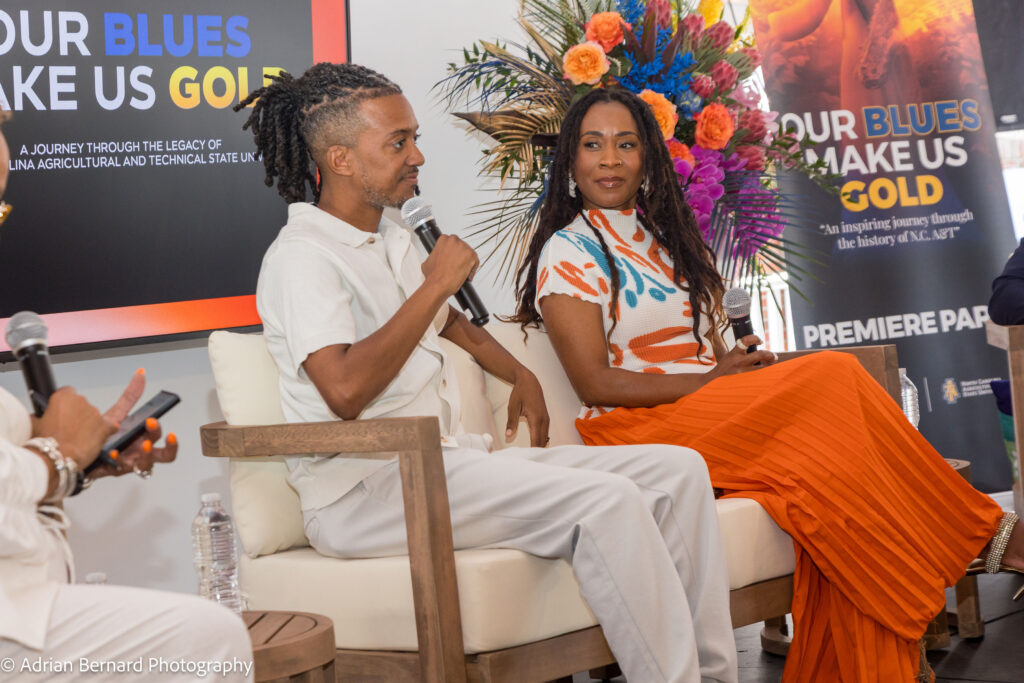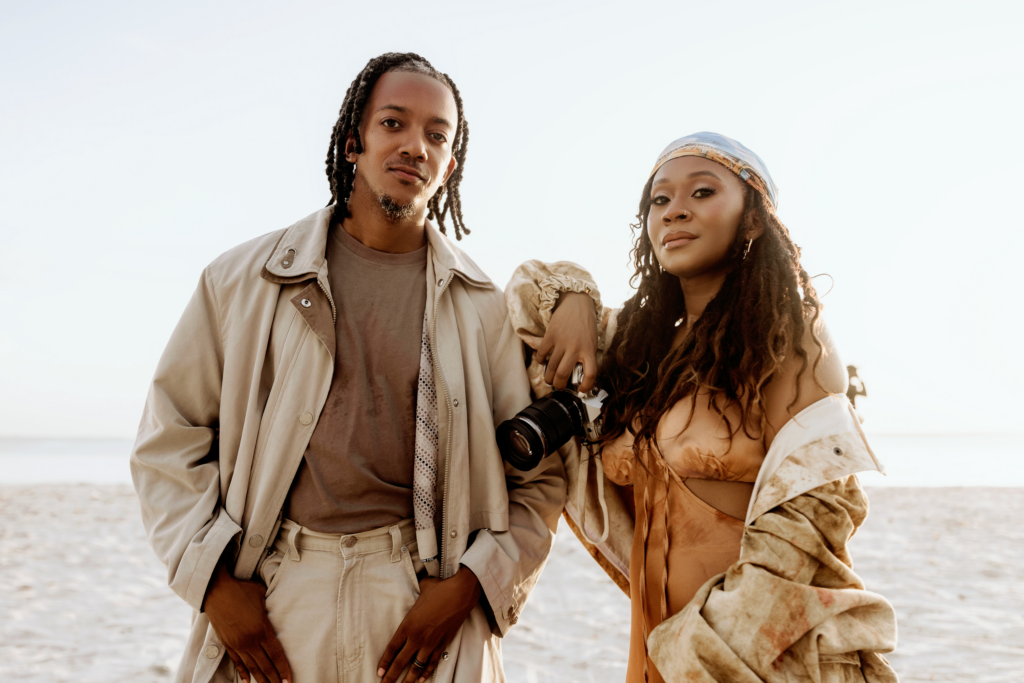North Carolina Agricultural and Technical State University has held the distinction of being the nation’s largest HBCU since 2014. Before seeing record-breaking enrollment numbers and gaining national recognition for its STEM and medical programs, NC A&T played an indelible role in the Civil Rights Movement and in cultivating a space for educational and cultural growth for generations of Black people. In the documentary “Our Blues Make Us Gold”, filmmakers Ashley Shantè and Brandon Deese capture the history and resilience that fuel the “Aggie Pride” associated with NC A&T. Each episode presents historical or first-person narratives that show how the university stands as a beacon of progress not only for itself but for HBCUs across the nation.
The documentary highlights the impact of the A&T Four (also known as the Greensboro Four), the four first-year students who sat at a downtown Woolworth’s lunch counter in February 1960, sparking a sit-in movement that spread across the South. It also revisits the often-overlooked May 1969 NC A&T/Dudley High School Revolt, when students protested the National Guard storming the campus. From there, the film emphasizes the university’s present-day legacy, marked by educational milestones such as its award-winning agricultural program and its standing as one of the top producers of African American graduates in engineering and other STEM fields. Episodes also feature interviews with notable HBCU graduates who embody the DNA of greatness that emerges from NC A&T and institutions like it.
HBCUs are more than homecomings, famous marching bands and stacked athletic departments. As the documentary’s title suggests, they are an everlasting symbol of “our blues” — our struggle, our heartbreak, our resistance — and “our gold” — our pride, our progress, our global impact.
Following the film’s screening at the 2025 Martha’s Vineyard African American Film Festival, Blavity’s Shadow and Act spoke with Shantè and Deese about how “Our Blues Make Us Gold” serves as a love letter to NC A&T and HBCUs everywhere.

Aside from pride in North Carolina A&T and other HBCUs, what inspired you to create “Our Blues Make Us Gold?”
Ashley Shantè: Actually, it didn’t start with pride. It started with anger and frustration. At the time of ideation, I was working in the TV writers’ room of a popular TV show. A new character was being written into the series, and it had been decided that this character was very intelligent and progressive. They asked the room for suggested alma maters. I raised my hand and confidently suggested it should be an HBCU. The comments that followed were snarky and ignorant. It was a feeling I couldn’t shake. I went home and talked to B about it. I had the idea, but I needed B to be the engine behind it. That’s where it began.
Brandon Deese: I think artists truly love the word “can’t.” Especially when the powers that be say that “can’t” or “shouldn’t” be done. That word is usually fuel for us to create. So I played the empathetic husband for all about 90 seconds, and then the light bulb went off and I told Ashley…” you know this is really a movie.”
Can you share any takeaways or key moments from the documentary that stood out to you while researching the rich history of NC A&T?
AS: For me, it was the legacy of resilience we have as a people in this country. Not one thing has been easy for us, yet we come out of the fire, shining like diamonds. I think of Sandra Hughes in particular. Her life was threatened almost every day by reporting the news. Imagine keeping your head on straight to do your job during a bomb threat?!
BD: For me, it was the story of Ben and Leon – the Moses Brothers. And how much we take for granted, how our food gets to the table. We need food to sustain us, so it was humbling to witness an agriculturally based family that is responsible for feeding a city, a state, and our nation. Shining a light on them also helped us honor our grandparents who worked the land when they were our age.
How do you feel NC A&T’s history and story is an all-encompassing story of the impact and influence of HBCUs?
AS: Honestly, that’s the thing I am most proud of. We just screened the doc at MVAFF. Various HBCU alums attended and told us how proud and connected they felt to the doc. Even though the doc primarily focuses on A&T, it showcases the rise of HBCUs and why they are so instrumental in the success of the black community, which has changed American history.
BD: This documentary showed me that HBCUs really do take on for their students, faculty, and staff the role of an extended family. You are not a number or a dollar sign at an HBCU; you are a full human being with hopes and dreams. And from your first day, you now have a bunch of aunties, uncles, cousins, mother and father figures who are deeply invested in helping you tap into your absolute brilliance.
Historically, HBCUs have been vital in addressing racism and systemic oppression, especially NC A&T and its role in the Civil Rights movement. How does the documentary detail their contributions?
AS: The A&T Four were the four courageous gentlemen who sparked the sit-in movement that spread throughout the South. Jesse Jackson was the first African American to make a serious bid at gaining a major party nomination, paving the way for President Barack Obama and Vice President Kamala Harris. A&T had a strong Black Panther presence. We touch on all of these significant moments in history. They were led by A&T, but the entire nation benefited from it.
You have several notable HBCU graduates throughout the documentary. What do you feel is a distinctive attribute of HBCU graduates?
AS: There is a quote in the doc by Dr. Teresa-Jo Styles: “Black Americans excel at HBCUs, because they feel free to excel.” That is the one common thread I have seen with the HBCU community. They have been fueled with so much confidence and pride in themselves, which helps propel them to do great things.
Ashley, with your experience in the writer’s room, do you feel there is a certain rhetoric around HBCUs in Hollywood and areas of show business?
AS: Unfortunately, there are a lot of Black stories in Hollywood that are not being told by Black people. Because many of these people are completely unfamiliar with HBCUS, it’s so easy for them to deem them insignificant.
Although you two did not attend an HBCU, what experiences do you share with Black colleges and universities?
AS: I have family members who are decorated scholars, and by far some of the most intelligent people I’ve met. I also grew up watching “A Different World.” Unfortunately, I did not know any artists personally from HBCUs. Had I been guided, I would have known about the long list of successful artists who came out of HBCUs.
BD: The late 80s/early 90s shows like “A Different World” and films such as “School Daze” really helped bring HBCUs into my consciousness. My father, Willie Deese, is a very proud A&T alum, so I started attending homecomings in my late teens. I did my first documentary on A&T’s Homecoming in 2005, so I have over 20 years of experience exploring the impact of HBCUs. I have never been back to NYU since graduation.

How does the documentary explore the impact that HBCU graduates have on the world, especially mainstream media and pop culture?
AS: The documentary helps make it evident that extracting HBCUs from our nation would create a major void in the inventions, economy, and skills of our globe.
BD: We try to establish early on in the doc that HBCUs are really the driving force of some of the world’s brightest Black professionals, from doctors to lawyers, to farmers to scientists…and everything in between. Every sector you can imagine has gotten a boost from an HBCU graduate.
How does the documentary dispel the stigma and misconceptions that HBCUs are just homecomings and parties?
AS: This was the main driving force behind telling this story. As Brandon is quoted in the documentary saying, “Can you show the world that an HBCU is more than the band, homecoming, and football?” If I can say so myself, we successfully did that! We highlighted the great Ronald McNair, the second Black astronaut to go to space, Janice Bryant-Howroyd (the first Black Woman to have a billion-dollar company), and the Moses Brothers, two of the most successful Black farmers, among others.
BD: We love the band. We love the athletics as those are great access points for anyone to learn about an HBCU. But here again, it was just as important for us to tell the story of the football player who happened to double major in Agriculture and Education while balancing a collegiate athletic career. Our company was founded on the principle of showing the balance of the Black American experience.
How do you feel “Our Blues Make Us Gold” will inspire current or future students of NC A&T and other HBCUs when it comes to upholding the legacy and mission of those universities?
BD: It was really important for us, knowing we needed to make this an intergenerational story. One where we honored the history while also being present in real time to contextualize what is going on currently. Knowing that if we chose students and alumni who could help tell the stories of their own family legacies, we would be able to find the common threads that relate us across generations.
The film is now available for streaming on Prime Video and can be purchased or rented on the platform as well.
